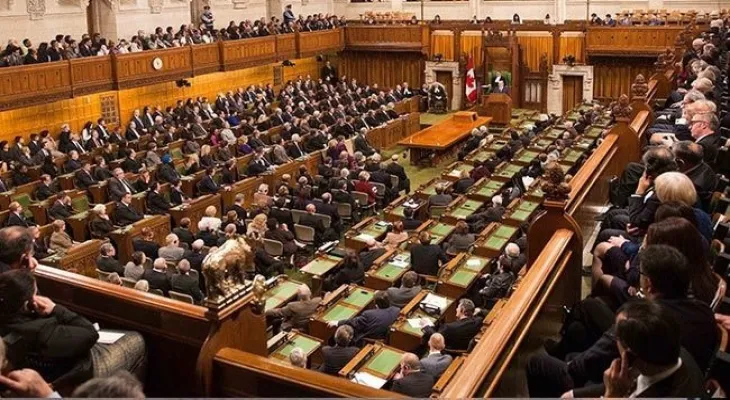Search here
Newspaper
Search here

Arab Canada News
News

Published: October 17, 2024
Canadian observers revealed today, Thursday (October 17, 2024), significant withdrawals within the ruling Liberal Party in the country, indicating that this suggests early elections are near and the Liberal Party is losing power.
Observers explained in their talk to "Baghdad Today" that "20 members of the Canadian Parliament from the ruling Liberal Party announced their withdrawal and called for the dismissal of the current Prime Minister Justin Trudeau," noting that "about 25 members of the Democratic Party supporting the Liberal Party also announced their withdrawal of support for the party."
They added that "this means early elections are approaching in Canada and the Conservative Party will be the one to win these elections and form a majority government."
The Canadian Parliament is divided among four parties, with the Liberals holding 154 seats, the Conservatives 119 seats, the Bloc Québécois being the third largest party in the country with 32 seats, while the New Democratic Party holds 24 seats.
According to opinion polls, the expected seat distribution will be as follows:
Conservative Party (222 seats): This indicates a strong position allowing them to form a majority government, which will enable them to control legislative decisions and implement their political agenda more effectively.
Liberal Party (57 seats): This represents a significant decline for the Liberals, indicating a loss of support in various regions, which may lead to questions about leadership and direction within the party as they prepare to reassess their situation after the elections.
Bloc Québécois (42 seats): The Bloc appears to maintain a strong presence in Quebec, reflecting its continued influence on regional issues and focus on Quebec nationalism.
New Democratic Party (20 seats): The New Democratic Party seems to have a smaller presence, which could spark discussions about their future strategies, especially in attracting progressive voters.
Green Party (2 seats): The Green Party still has a minimal presence and faces challenges in expanding its influence, especially in a more polarized political environment.
These results may lead to discussions about their implications for national policies, party strategies, and voter sentiments in the upcoming period.
After analyzing the results of these polls, the following data emerges:
Conservative Party (222 seats):
Regional performance: The Conservatives achieved significant victories in many provinces, especially in Ontario and Western Canada, where they focused their campaigns on economic and security issues.
Strategies: The party employed populist strategies, turning to issues like the cost of living and security, which contributed to attracting voters.
Liberal Party (57 seats):
Declining support: The party has seen a noticeable decline in its seats, especially in Ontario and Quebec, indicating voter dissatisfaction with the government's handling.
Reactions: This decline may prompt the party to revise its policies, possibly leading to changes in leadership or strategic directions.
Bloc Québécois (42 seats):
Local focus: The Bloc maintained its strength on Quebec-related issues, reflecting voter support for focusing on regional concerns.
Nationalist discourse: The Bloc has reinforced its nationalist rhetoric that focuses on protecting French culture and language, which has helped maintain its electoral base.
New Democratic Party (20 seats):
Challenges: Despite making some gains, the party faces challenges in competing with the Liberal Party on leftist issues.
New strategies: The party may need to enhance its strategies to attract young and marginalized voters.
Green Party (2 seats):
Expansion challenges: The party faces difficulties in expanding, necessitating a reevaluation of its strategies amidst intense competition.
Environmental issues: With environmental matters remaining a top priority, the party may need to amplify its message to gain broader support.
Possible political implications:
Government formation: With the Conservative Party obtaining a majority, they will be able to implement their agenda quickly, including laws related to taxes and the economy.
Inter-party cooperation: The decline of the Liberal Party may lead to increased cooperation among other parties, especially on issues related to social justice and the environment.
Political stability: Having a majority government may provide greater political stability, facilitating decision-making in Parliament.
In summary: These elections represent a significant shift in Canadian politics, with strong Conservatives emerging and a notable Liberal decline; other parties will need to reassess their strategies and adapt to these new dynamics, and attention will now turn to how the new government responds to the economic and social challenges in the country.
Comments